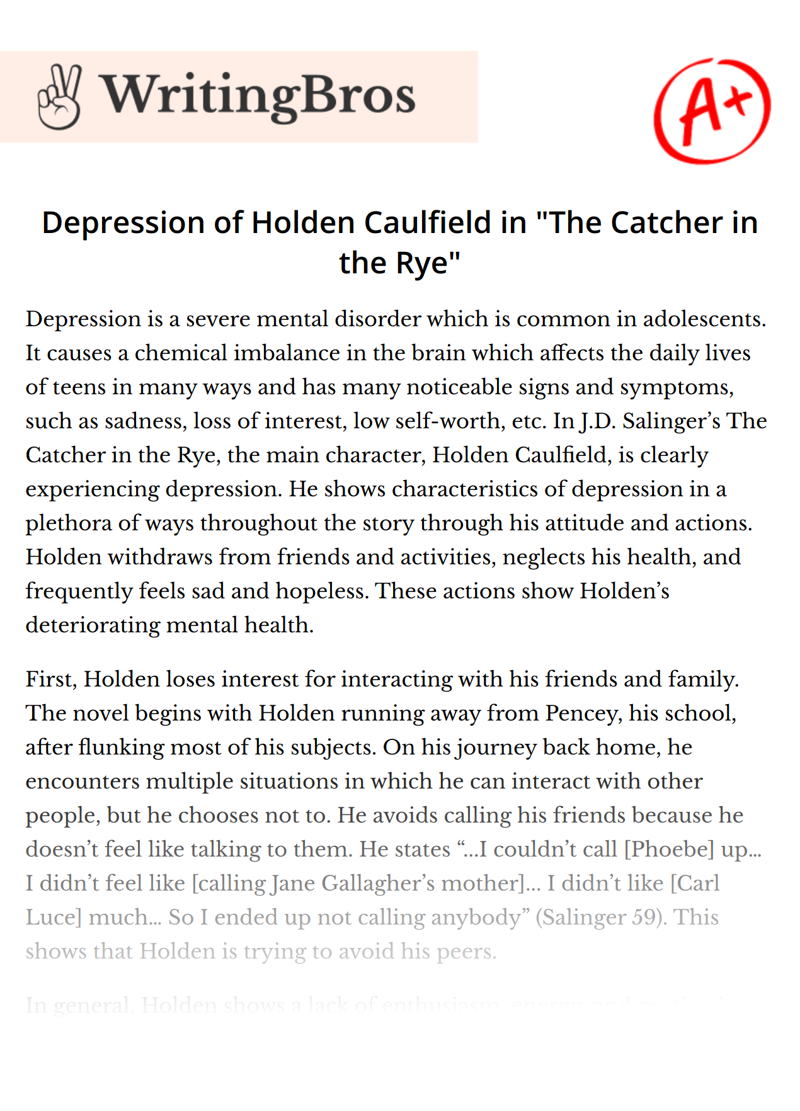Depression of Holden Caulfield in "The Catcher in the Rye"

Depression is a severe mental disorder which is common in adolescents. It causes a chemical imbalance in the brain which affects the daily lives of teens in many ways and has many noticeable signs and symptoms, such as sadness, loss of interest, low self-worth, etc. In J.D. Salinger’s The Catcher in the Rye, the main character, Holden Caulfield, is clearly experiencing depression. He shows characteristics of depression in a plethora of ways throughout the story through his attitude and actions. Holden withdraws from friends and activities, neglects his health, and frequently feels sad and hopeless. These actions show Holden’s deteriorating mental health.
First, Holden loses interest for interacting with his friends and family. The novel begins with Holden running away from Pencey, his school, after flunking most of his subjects. On his journey back home, he encounters multiple situations in which he can interact with other people, but he chooses not to. He avoids calling his friends because he doesn’t feel like talking to them. He states “...I couldn’t call [Phoebe] up… I didn’t feel like [calling Jane Gallagher’s mother]... I didn’t like [Carl Luce] much… So I ended up not calling anybody” (Salinger 59). This shows that Holden is trying to avoid his peers.
In general, Holden shows a lack of enthusiasm, energy, and motivation. Even his own sister Phoebe, who does not see him often, says to Holden, “You don’t like anything that’s happening… You don’t like any schools. You don’t like a million things. You don’t” (Salinger 169). This clearly shows Holden’s disinterest in activities. Holden also makes a remark that it would be a good life to live far away in the woods, make a living by himself, and not have to deal with other people. Therefore, Holden is distancing himself from the outside world.
Second, Holden has a great neglect for his own personal health. He shows changes in eating patterns by eating very little, causing him to appear skinny and malnourished. Holden also gets little to no sleep and experiences frequent headaches, dizziness, and nausea. More often than not, those who are suffering from depression attempt to “numb their feelings” with substances such as nicotine and alcohol. Holden smokes to the extent of tuberculosis and drinks almost every day during his journey back home. He is clearly abusing tobacco and alcohol.
Another common symptom of depression is sexual promiscuity. Holden tries to “neck” girls to feel better about himself. During his stay at the hotel, Holden invites a prostitute over to his room but ends up rejecting her because he feels too sad to do anything, which shows his depression in two ways. The article states, “Teens may experiment with drugs or alcohol or become sexually promiscuous to avoid feelings of depression” (Mental Health America). Holden does exactly this. His overall deteriorating physical health is mirroring his mental health and points to depression.
Finally, Holden feels sad and hopeless, which also proves his depression. He frequently ponders over his death. He seems to have come to terms with the fact that he is going to die in a way that shows that he is almost inviting his death with open arms. Towards the end of the novel, Holden states, “I had this feeling that I'd never get to the other side of the street. I thought I'd just go down, down, down, and nobody'd ever see me again” (Salinger 197). He states that he “really felt like, committing suicide” (Salinger 104). He is always referring to objects and experiences as depressing, which is a red flag for depression. He says “makes [him] so depressed” (Salinger 75), “that’s depressing” (Salinger 211), and “it’ll depress you” (Salinger 194), which make it obvious that Holden is suffering with severe mental illness.
In conclusion, Holden Caulfield is suffering from depression and makes it clear with his thoughts and actions. He distances himself from other people as much as possible (including his friends and family), treats his body poorly to the point of physical sickness, and is in a constant state of despair and sadness, which are clear symptoms of this mental illness. Holden is not just another moody teenager; he is suffering from a dangerous, progressive mental disorder which must be resolved.
Cite this Essay
To export a reference to this article please select a referencing style below

